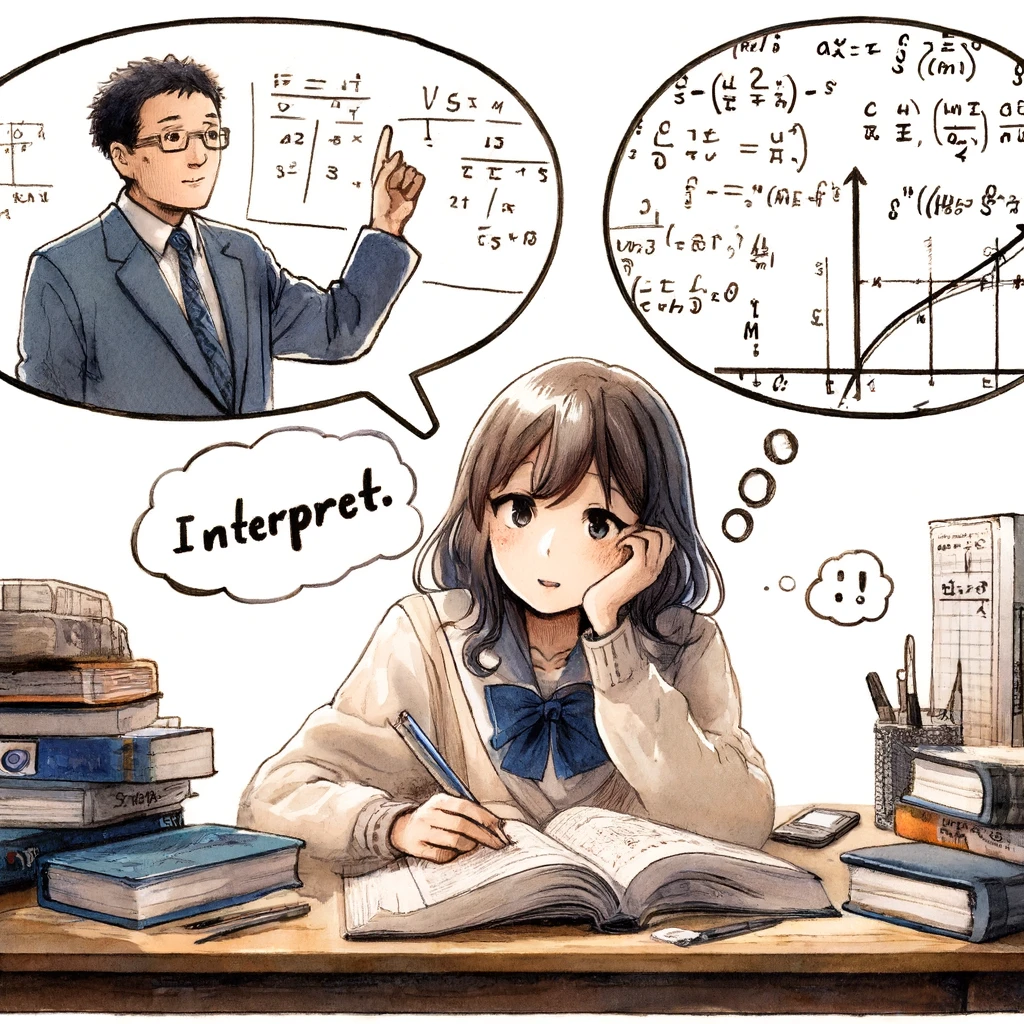# inscrutable /ɪnˈskruːtəbl/ adj.
Any person or thing that's mysterious, mystifying, hard to read, or impossible to interpret is inscrutable.
You ever notice how it's hard to tell what some people are thinking? Those folks are inscrutable.
Someone with a poker face shows no emotion and is difficult to read, making them inscrutable.
A good way to think about what inscrutable means is to consider cats and dogs.
Dogs wear their hearts on their sleeves, shaking when they're afraid and bouncing up and down when they're happy. Dogs are definitely not inscrutable, because you can tell what they're thinking and feeling.
On the other hand, cats are very difficult to read. Even longtime cat owners aren't always sure what's going on with their kitty. Cats are very inscrutable animals.


- Word Origin
- "Inscrutable" comes from the Latin word "inscrutabilis," meaning "not to be searched into." This can help you remember that inscrutable refers to something that cannot be easily understood or deciphered.
- Mnemonic Device
- Break it down into "in-" (not) and "scrutable" (able to be understood). Imagine something that is "not scrutable," or not able to be understood.
# interpret /ɪnˈtɜːrprɪt/ ●●○
When you interpret something, you make sense of it.
You could interpret a graph, a foreign language, or even Mona Lisa's odd smile.
Think of a detective solving a mystery. Just like a detective interprets clues to understand what happened, you interpret information to understand its meaning.




- Word Origin
- "Interpret" comes from the Latin word "interpretari," meaning to explain or translate. This origin can help you remember that interpreting involves explaining or understanding.
- Mnemonic Device
- Think of "in" + "terpret" as "in-terpret." Imagine you are diving "in" to "interpret" a text or piece of art, going "inside" to find its meaning.
# intention /ɪnˈtɛnʃən/ ●●●
An intention is idea that you plan (or intend) to carry out. If you mean something, it's an intention.
Do not say that someone ‘has no intention to do something’. Say that someone has no intention of doing something.
Your goal, purpose, or aim is your intention.
It's something you mean to do, whether you pull it off or not.
You may have the best intention of cooking an incredible meal, but if you leave the burner on and burn the house down, you will not be remembered as an excellent chef.
When a father asks his daughter's boyfriend "What are your intentions?" that means something specific: Does he want to marry her?



- Word Origin
- "Intention" comes from the Latin word "intentio," which means a stretching out or striving for. This origin can help you remember that an intention involves a purpose or aim you are reaching toward.
- Mnemonic Device
- Think of "intention" as "in-tension." Imagine a string pulled tight with a goal at the end. The tension represents the focus and effort toward achieving that goal.
# suspect /ˈsʌsˌpɛkt/ n. /səˈspɛkt/ v. ●●○
A suspect/ˈsʌsˌpɛkt/ is a person who is believed to be guilty of a crime.
If you leave the scene of a murder with blood on your hands and a weapon in your pocket, you’re likely to become a prime suspect.
If others believe you have committed a crime, you are a suspect.
The word can also be used as a verb and an adjective. To suspect/səˈspɛkt/ someone of something is to believe that they probably did it.
Do you ever suspect your parents of taking some of your Halloween candy?
If something such as someone's excuse or motive is suspect, it seems a bit off.
That bad-smelling piece of fish is suspect — you'd better not eat it.
Noun (SUS-pect) /ˈsʌsˌpɛkt/
Verb (sus-PECT) /səˈspɛkt/



- Word Origin
- "Suspect" comes from the Latin word "suspicere," meaning to look up at or to look at secretly. This origin can help you remember that suspecting often involves looking closely at something or someone with doubt or suspicion.
- Mnemonic Device
- Break it down into "sus-" (short for suspect) and "pect" (sounds like "peeking"). Imagine you are peeking around a corner to catch someone doing something suspicious.
# dim /dɪm/ ●○○
Dim has several meanings related to a lack of light, hope, or knowledge.
A room that is not well lit is dim, a slow thinker is dim, and when life looks hopeless, your prospects are dim.
To dim a light is to dull it, like by putting a shade over it. When the light from a candle dims, it becomes less bright.
A vague idea without a lot of specifics is also dim, since it's hard to see or understand the idea.
Someone who's not very bright is dim or a dimwit.
When things are hopeless, they're dim too. For example, if a football team is losing by fifty points, their chances of winning are dim.
The dim outline of a building loomed up out of the mist.
take a dim view of something = to disapprove of something






- Word Origin
- "Dim" comes from the Old English word "dim," which means "dark, obscure." This origin can help you remember that dim refers to low light or unclear vision.
- Mnemonic Device
- Think of "dim" as "diminished light." The word "diminished" can help you recall that dim means having less light.
# discern /dɪˈsɜrn/ ●○○
If you can make out, pick out, or distinguish something, you can discern it. This is a word for recognizing and perceiving things.
Discerning has to do with being able to see or hear something. In a loud room, it can be hard to discern one person's voice.
If there's not much light, you'll have trouble discerning the words on a page well enough to read.
If you have sloppy handwriting, then it's hard to discern what you wrote.
When you can discern something, you can tell what it is; you can identify it.
- Word Origin
- "Discern" comes from the Latin word "discernere," meaning "to separate" or "to distinguish." This origin can help you remember that discerning involves distinguishing or recognizing something.
- Mnemonic Device
- Think of "discern" as "dis-cover" or "dis-cern" (like "scan"). Imagine uncovering or scanning something to recognize or perceive it clearly.



# intrigue /ˈɪn.triːɡ/ n. /ɪnˈtriːɡ/ v. ●○○
An intrigue/ˈɪn.triːɡ/ is a secret plot. If you ever become the monarch of a small island kingdom, keep watch for signs of any intrigue against you.
Intrigue comes from the Latin verb intricare, to entangle, and is related to intricate.
It can be a noun, meaning underhanded plot, or a verb for the act of plotting.
Agents of two opposing powers intrigue/ɪnˈtriːɡ/ against each other.
In the late nineteenth century it also came to mean the feeling of curiosity or interest. If someone's ideas intrigue you, you want to know more about them.
Noun IN-trigue /ˈɪn.triːɡ/
Verb in-TRIgue /ɪnˈtriːɡ/



- Word Origin
- "Intrigue" comes from the French word "intrigue," which originally meant "a plot or scheme." This can help you remember that intrigue involves something secretive or fascinating.
- Mnemonic Device
- Think of "intrigue" as "in-trick." Imagine being pulled "in" by a trick or a plot.